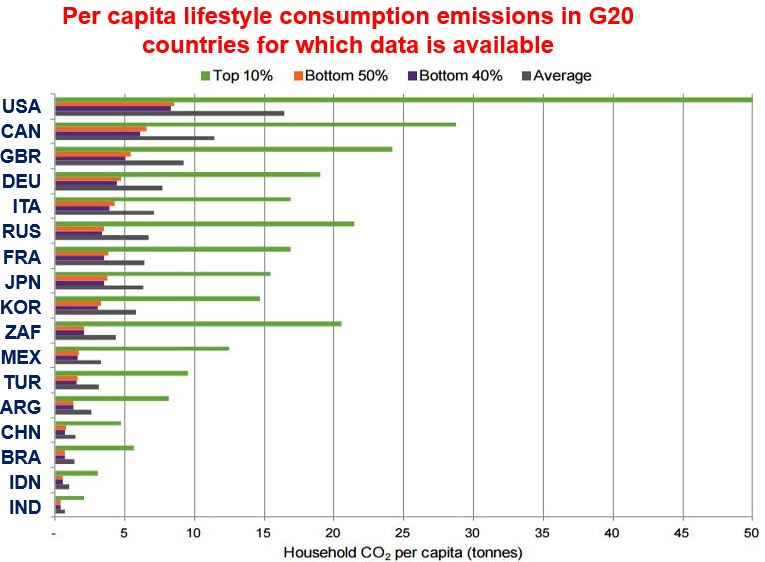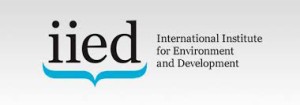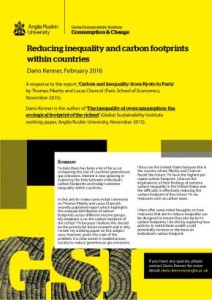Defining the research agenda on inequality and unsustainable consumption
Dario Kenner, May 2016
In mid-April a group of academics and representatives from NGOs met at the International Institute for Environment and Development in London to discuss the challenge of reducing inequality and unsustainable consumption. I presented my research on the ecological footprint of the richest people and set out what I saw as the priority questions to focus on.
Targeting the richest
There is currently a lot of debate on extreme income and wealth inequality. But there’s less focus on carbon inequality where individuals are responsible for different levels of greenhouse gas emissions associated with their consumption (e.g. flying, buying meat). Research by Oxfam and the French economists Thomas Piketty and Lucas Chancel estimate this carbon inequality is a serious problem with the richest people (e.g. richest 10%) emitting a lot more than those below them (see graph).
Andrew Norton, director of IIED, agreed it was important to further explore the ecological footprint of the richest and said it was interesting to contrast this with the stronger narrative of the growing Asian middle class in the global south as being a source of ecological stress, environmental degradation and resource competition. Lyla Mehta (Institute of Development Studies) liked the focus on differentiated consumption as a contrast to a neo-Malthusian narrative about controlling population and environmental limits. Oliver Greenfield (Green Economy Coalition) argued that if the rich are to be targeted it will be crucial to recognise their power. Professor Danny Dorling (University of Oxford) explained that decision makers in the UK are often members of the richest 10% and MP’s in the richest 5%.

Source: Extreme Carbon Inequality (Oxfam, December 2015)
One of my key arguments is that governments’ need to target the richest people because they have much larger carbon footprints per person. This would complement efforts to ensure changes in consumption patterns across society. I argue it will be particularly difficult to encourage the richest people to make their consumption more sustainable because:
- They are more able to afford rising carbon taxes.
- They have more resources to adapt to extreme weather events.
- The competition between them to purchase status symbols such as yachts may lead them to ignore sustainable consumption initiatives.
One of the key tasks going forward is to improve the accuracy of the estimates of carbon inequality to inform policy.
Andrew Norton (IIED) highlighted that in the case of the richest people it is very difficult to obtain information on their income and wealth, let alone to quantify their consumption and ecological footprint.
Professor Ian Gough (LSE) said more nuanced data is needed because the current models used to estimate carbon inequality are too general. They apply assumptions about income and carbon footprint to all income groups in all countries in the same way. This means they do not reflect that people’s expenditure (and therefore greenhouse gas emissions) varies depending on how wealthy they are e.g. the proportion of income used for expenditure often declines as income rises.
Saamah Abdallah (New Economics Foundation) highlighted that a higher amount spent on the same product does not always mean it has higher embodied carbon emissions e.g. a £10,000 watch doesn’t necessarily lead to 1,000 times more CO2 emissions than one that costs £10.
Professor Angela Druckman (University of Surrey) said more detailed information is needed on the carbon footprint of the richest people’s investments because their expenditure is a small proportion of their individual worth (greater transparency around tax havens could facilitate this). This is particularly important as the richest people capture more and more wealth.
Whilst more work is needed to improve data I argued the discussion about policies to address carbon inequality, and in particular the carbon footprint of the richest people, should continue. I believe that civil society organisations need to campaign on carbon inequality to pressure governments to take action.
The link between reducing inequality and unsustainable consumption
The other main issue I discussed was the need to think through how to reduce inequality in ways that do not increase negative environmental impact. For example, governments’ could use additional revenue from taxing the richest to reduce national greenhouse gas emissions by:
- Investing in renewable energy
- Providing resources for adaptation
- Providing free and green public services
- Promoting the circular economy.
Richard Wilkinson (co-author of The Spirit Level) commented that decreasing inequality by decreasing the incomes of the rich could have the benefit of reducing the carbon footprint of the richest and simultaneously reduce the pressure to consume for everyone else. He said there is increasing evidence that shows more unequal societies have higher levels of conspicuous consumption, longer working hours, higher debt and bankruptcy.
Saamah Abdallah (New Economics Foundation) argued that when we say we hope reducing inequality will reduce overconsumption, what we are really saying is that we hope reducing extreme wealth will reduce overconsumption. We’re not advocating that the rich give up their super yachts so that we can all have yachts. We’re advocating that the rich give up their super yachts, full stop.
I went on to discuss whether redistribution would increase or decrease an individual’s carbon footprint (and therefore aggregate national emissions). The question I speculated on was if someone who received additional income would spend this on more carbon-intensive goods and services (e.g. flying), or buy “green” products (e.g. electric car), or save this money. I talked about some ways to redistribute wealth and also reduce carbon footprints such as through a green citizen’s income (where individuals could spend a lump sum on green products and services) and green conditional cash transfers (to encourage spending on green goods and services on the condition that people attended health check-ups, children went to school etc).
Professor Ian Gough (LSE) agreed that redistribution could increase greenhouse gas emissions. For example, the poorest often spend more on high-carbon necessities such as food, heating homes and transport. He advocated eco-social policies such as taxing high-carbon luxuries and carbon rationing to achieve environmental and social goals together. Andrew Simms (New Weather Institute) argued that patterns of production and consumption are likely to be different in future and therefore would change the consumption effects of redistribution. He pointed to work by David Woodward about the possibilities of rural development models in the global south which are both positively redistributive and lower carbon.
Oliver Greenfield (Green Economy Coalition) advocated instead of trying to fix an unsustainable economy that is already broken (with a plaster such as redistribution) there should be more focus on predistribution to build a system that allows you to consume less, to have more value and own more. He gave the example of the energy transition in Germany (energiewende).
——————-
The Critical Theme seminar was attended by: Anna Thomas (ActionAid), Graham Gordon (CAFOD), Richard King (Chatham House), Richard Wilkinson (Equality Trust and co-author of The Spirit Level), Oliver Greenfield (Green Economy Coalition), Andrew Norton (IIED), Professor Ian Gough (LSE), Chris Williams and Saamah Abdallah (New Economics Foundation), Andrew Simms (New Weather Institute), Joana Alfaiate (Save the Children), Deborah Hardoon and Katherine Trebeck (Oxfam), Ben Milligan (UCL), Professor Danny Dorling, Tina Fawcett and Ruth Mayne (University of Oxford), Professor Angela Druckman (University of Surrey), Lyla Mehta (Institute of Development Studies), and Andreas Hansen (WWF).
 Find out more about the Critical Theme on tackling inequality and unsustainable consumption held at IIED in April 2016. Includes SlideShare presentation and Storify.
Find out more about the Critical Theme on tackling inequality and unsustainable consumption held at IIED in April 2016. Includes SlideShare presentation and Storify.
Reducing inequality and carbon footprints within countries
Published by the Global Sustainability Institute (Anglia Ruskin University) this article is a response to the report Carbon and inequality by Thomas Piketty and Lucas Chancel.

Pingback: Carbon Inequality & Politics | From Poverty to Power